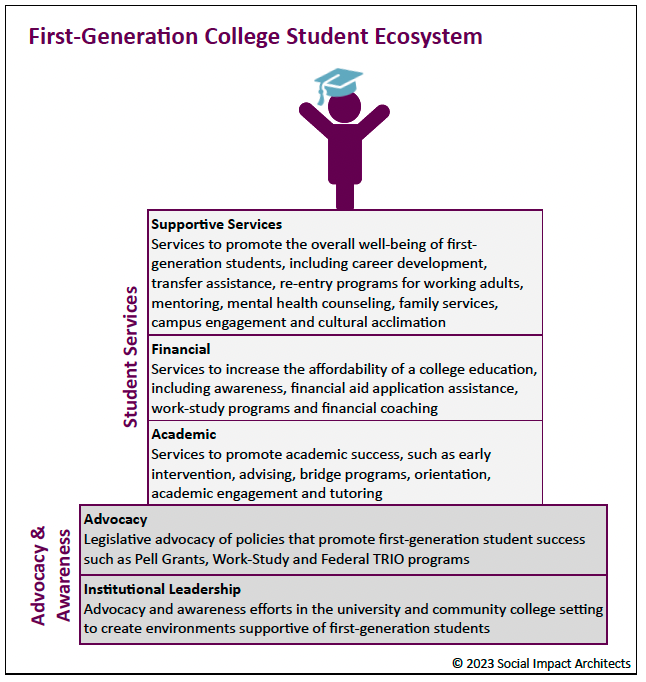 Back-to-school season is upon us. For some students, it is routine. For others going to a new school, it can feel like stepping into the unknown. In many ways, first-generation college students are much like astronauts. Exploring uncharted territory always take a little longer than taking a known route. It took eight years for man to walk on the moon, but successive missions reaped the benefits of the inaugural experience. We find this to be generally true of all things we do for the first time – playing a sport, writing a grant proposal or launching a new business – and it is most certainly true for students who are the first in their families to go to college. This is why we are so glad that many colleges and universities have developed programs to help them navigate their academic journey.
Back-to-school season is upon us. For some students, it is routine. For others going to a new school, it can feel like stepping into the unknown. In many ways, first-generation college students are much like astronauts. Exploring uncharted territory always take a little longer than taking a known route. It took eight years for man to walk on the moon, but successive missions reaped the benefits of the inaugural experience. We find this to be generally true of all things we do for the first time – playing a sport, writing a grant proposal or launching a new business – and it is most certainly true for students who are the first in their families to go to college. This is why we are so glad that many colleges and universities have developed programs to help them navigate their academic journey.
First-generation college students experience predictable turbulence as they pursue their course. Their pioneering status can make them feel less prepared – they are twice as likely to drop out as their peers who have a parent with a post-secondary degree. To help social sector agencies stay on top of best practices and emerging trends in the first-generation universe, we wanted to share a few industry highlights.
There are currently two approaches to help first-generation students succeed.
A Comprehensive Student Services Approach
Investments in first-generation student success are heavily focused on a comprehensive approach that breaks down barriers related to academic preparation and financing. Services are generally not piecemeal; rather, students receive support in all areas of the ecosystem: academic, financial and supportive. The evidence base for comprehensive student services programs today stems from Federal TRIO Programs, including Upward Bound, that require a focus on academic instruction, tutoring, counseling, financial advising and more. Similar successful programs include secondary school-based YES Prep College Initiatives, post-secondary school-based AVID for Higher Education and the Suder Foundation’s First Scholars Program.
Building Advocacy and Awareness
Just like astronauts depend on NASA’s mission control for support, first-generation students can rely on a thriving supportive environment in their schools and communities. College presidents at schools like Santa Barbara City College and Walla Walla Community College have been ensuring student success by articulating broad strategic visions, creating lasting change and committing needed resources. Promising practices in the field are being cataloged and shared by Achieving the Dream. Universities and corporations are also developing practices to help first-generation students thrive through new programming, research and symposia.
Every successful mission needs resources to launch and sustain operations. Major funders of the first-generation ecosystem include the Dell, Kresge, Lumina, Posse and Walmart Foundations. You can follow them and other service providers on X (formerly Twitter) or by using #firstgen.
Making the path to graduation just a little easier to navigate for first-generation college students is a noble mission. We hope this industry sketch provides you with a benchmark to compare your first-gen programs, and we invite you to share your success stories with us.


Great article, Suzanne! I would just like to add that we have developed a strong interest in support service that I believe should have a place in the diagram above: financial coaching. Financial barriers prevent many students (particularly community college students) from completing their degree, and financial coaching has been shown to be an effective in helping students understand how to manage short-term financial challenges and provide tools to aid success, so that they can earn a degree in high demand field of study and strengthen their family over the long haul.
Programs like Central New Mexico Community College’s CNM Connect effort and Skyline College’s SparkPoint Center have leveraged financial coaching as the central piece of a financial support strategy that has demonstrated strong impact on student retention and graduation in a short period of time. United Way has supported a similar program at Mountain View College since 2012, and we are hopeful that we will deliver similarly strong results once we can capture all of the necessary data.
Galen,
Thank you for sharing your insight and experience with UWMD! We agree that financial coaching can be an extremely useful tool for first-gen students and realize that many colleges, particularly community colleges, are home to financial opportunity centers and other coaching programs that help all students manage finances to complete their degrees. We have updated our ecosystem model to reflect your great insight. The blog research really narrowed in on programs specific to first-generation college students, and while there is substantial overlap with low-income college students, many of the targeted first-gen ones had not evolved financial services to the degree of FOCs or advanced financial coaching. This certainly does not mean that they don’t exist or that the coaching should not be included in the model, but that just reflects the limitations of secondary research. Let us know if you’ve heard of a first-gen program doing this. We’d be very interested to hear about it!
Thanks again, Galen!
Suzanne
Thanks for the mention, Galen. One of the major reasons that CNM Central New Mexico Community (and many others like Skyline College Sparkpoint) has experienced success is the strengths-based approach in providing these services. The attitude of cultural humility is not one of having to “save” these first-gen students, but to help them recognize and leverage their own strengths as well as those of their families and communities. Great article, Suzanne.